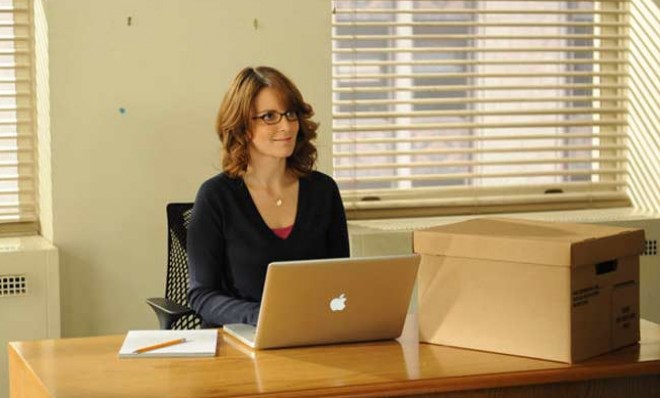The end of 30 Rock: 6 eulogies for the series
Critics weigh in on NBC's cultishly beloved sitcom, which ends tonight after seven seasons


Blergh. Tonight, NBC's adored sitcom 30 Rock is coming to an end after seven seasons. The double-length series finale will pick up where last week's episode left off, as Liz adjusts to life as a mother and former page Kenneth takes the reins at NBC. Though 30 Rock has never been a major ratings success for NBC, the end of the series is a crushing blow to the many TV critics who have spent the past seven years endorsing its hilarious, idiosyncratic take on the sitcom format, which made it one of the most innovative, unpredictable, and internet-friendly shows on TV. On the day it comes to an end, six writers eulogize 30 Rock:
1. At Rolling Stone, Brian Hiatt offers an in-depth look at 30 Rock from conception to finale:
For Fey, the biggest triumph of 30 Rock is its very survival: the unlikely persistence of a show sufficiently unhinged to use blackface on three occasions; to have Jane Krakowski's monstrously narcissistic Jenna Maroney consummate her self-adoration by marrying her own male impersonator; to have Elizabeth Banks' Avery Jessup kidnapped by Kim Jong-Il as an unfortunate consequence of NBC's "Hot Blondes in Weird Places" initiative. "I feel like we made a lot of good episodes of the kind of show that usually gets canceled," says Fey. "The kind where there's 20 episodes and 'only me and my hipster friends know about it.' That part’s still true. But we made 140 of them!" What's really crazy about 30 Rock is its sheer verbal velocity — punch lines go by so fast that even smart people may need to rewind (an industrious blogger calculated that a 2010 episode averaged 9.57 jokes per minute). "It requires you to pay attention in a way that you don't always want to at the end of a long day," says Fey, "and I get that. I'm a professional comedy worker, and there would be days when I'm like, 'I love Arrested Development, but I don't want to watch it right now.' " [Rolling Stone]
2. Robert Lloyd at The Los Angeles Times on 30 Rock's ultimate legacy:
The Week
Escape your echo chamber. Get the facts behind the news, plus analysis from multiple perspectives.

Sign up for The Week's Free Newsletters
From our morning news briefing to a weekly Good News Newsletter, get the best of The Week delivered directly to your inbox.
From our morning news briefing to a weekly Good News Newsletter, get the best of The Week delivered directly to your inbox.
I fell in love at first sight with Tina Fey's 30 Rock... We have both grown in the interim — well, 30 Rock has — and if it is not now the same series that first won my heart, by winning my head, it is an even better one, bold and confident and more completely itself.... What is the legacy of these critically acclaimed, low-rated, award-winning seven seasons? There's the useful phrase "I want to go to there," which Fey stole from her daughter Alice. And obviously, there's the example of Fey herself, as a groundbreaking Woman in Comedy: the 2010 recipient of the Kennedy Center's Mark Twain Prize for American Humor, author of a bestselling memoir, Bossypants, and a role model for ambitious nerd girls everywhere. It's not fair to say that there'd be no Mindy Kaling or Lena Dunham without her, but their paths would have been different and surely more difficult. [Los Angeles Times]
3. Alan Sepinwall at Hitfix on 30 Rock's place in television history:
The show's favorite subject was always television itself, a medium for which 30 Rock felt equal parts adoration and fear. The writers came up with one horrible fake movie or TV show idea after another — among the best of the very long list: "The Rural Juror," "A Blaffair to Rememblack," "Fresh-Ass, based on the novel Tush by Ass-Fire," "Bitch Hunter," "MILF Island" and "A Dog Took My Face And Gave Me A Better Face To Change The World: The Celeste Cunningham Story" — yet there was also so much affection for the medium and our communal history watching it. 30 Rock came on the air near the start of what seems to be the death rattle of network television — it likely wouldn't have lasted seven seasons with its ratings if NBC hadn't been in such dire straits — and though Jack and other characters frequently commented on the terrible state of the business, the show always viewed that with sadness. Kenneth was a character fueled by nothing except a love of television and a desire to work in it, which is why he spent so many years in the demeaning job of NBC page; when Jack improbably promoted him to network president last week, it was treated as a deserved outcome. [HitFix]
4. Alyssa Rosenberg at ThinkProgress on 30 Rock's unique insights into race:
Almost from the moment we met her, one of Liz Lemon's signature preoccupations was demonstrating that she was not, in fact, a racist. "Race is a huge issue, according to Newsweek magazine," Jenna Maroney (Jane Krakowski), Liz's best friend told her in an early episode of the show they created together. "Well, it is 2007 and some of us don't have these hangups," Liz declared, proud of herself. But of course, Liz is rife with racial hangups, many of which she mistook for sensitivity. In the season one episode "Jack-tor," for example, Liz became convinced that Tracy was illiterate after he flubbed a series of cue cards. When she offered to give him time off to attend reading classes, Tracy amused himself by taking advantage of her condescension. "I can't read!" he declared histrionically as he high-tailed it out of the office. "I sign my name with an X! I once tried to make mashed potatoes with laundry detergent! I think I voted for Nader!" When she discovered that he was tweaking her, rather than examining her own preconceptions, Liz got huffy about Tracy's reaction to her assumptions. "He took advantage of my white guilt, which is only to be used for good, like overtipping, and supporting Barack Obama," she explained, casting herself a a victim, and long before Obama even formally began his campaign for president, setting up support for him as a proxy for racial self-congratulation by white voters. [ThinkProgress]
5. 30 Rock writer Tom Ceraulo gives a behind-the-scenes look at the show's final days at Buzzfeed:
In a lot of ways, I experienced my first season at the show as a 30 Rock fan: taking everything in, being as delighted by pitches, outlines, scripts, and table reads as I had been by watching the show at home during the first two seasons. I hung on every word in the writers' room — which, when you consider that one of my duties was to take notes, was actually quite helpful. But it got to the point that I'd take notes on the comedy bits that would organically break out, unrelated to the show. I stopped doing this after Tina looked through a list of potential story ideas and discovered one I'd typed about a medical condition in which a patient has a small penis growing in his or her mouth that gets aroused by hunger. "Our writers' assistants may be a little too thorough," she laughed, and I was mortified — but as with everything that happened that year, still pretty thrilled. [Buzzfeed]
6. Todd VanDerWerff at The AV Club draws a connection between the final seasons of 30 Rock and The Mary Tyler Moore Show:
A free daily email with the biggest news stories of the day – and the best features from TheWeek.com
Since it began seven years ago, 30 Rock has frequently been compared to Mary Tyler Moore. Even Fey has held it up as an early inspiration. But while I'd quibble with the direct lineage — the show has always seemed much more inspired by Norman Lear's 70s sitcoms and the sketch-comedy influences of Saturday Night Live to me — it's clear that Fey has drawn almost directly from the final-season well Moore set up in its final season. It's easy to see the lines she's drawn between Mary Richards — who ventured into the world of work when her thoughts of having a family just didn't prove as exciting to her as getting a job — and Liz Lemon — who found herself out of a job, but possessing a family. They're two women standing on either side of the "women in the workplace" revolution of the last 40 years, and in their final seasons, they provide different answers to the question of what it means to have a meaningful job, as well as what it means to have that job taken away from you, even if they deal with what seems to be the exact same material. The final season of 30 Rock could have seemed like a cover version of the final season of Mary Tyler Moore, but by staying true to its own voice, 30 Rock has found a new way to play around with old tropes, while still respecting all of the ground Moore broke. [The AV Club]
Scott Meslow is the entertainment editor for TheWeek.com. He has written about film and television at publications including The Atlantic, POLITICO Magazine, and Vulture.
-
 Find art, beautiful parks and bright pink soup in Vilnius
Find art, beautiful parks and bright pink soup in VilniusThe Week Recommends The city offers the best of a European capital
-
 Greenland: The lasting damage of Trump’s tantrum
Greenland: The lasting damage of Trump’s tantrumFeature His desire for Greenland has seemingly faded away
-
 Minneapolis: The power of a boy’s photo
Minneapolis: The power of a boy’s photoFeature An image of Liam Conejo Ramos being detained lit up social media
